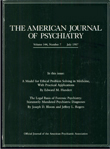Familial schizophrenia and treatment response
Abstract
Thirty-nine patients with chronic schizophrenia for whom hospitalization was clinically indicated received haloperidol for 4 to 6 weeks in a standardized dose schedule. Responders were compared with nonresponders for family history, baseline symptom factors, and ventricle-brain ratio (VBR). The lifetime risk for schizophrenia spectrum disorders was higher among first-degree relatives of nonresponders than among first-degree relatives of responders. Treatment responders had higher baseline scores on the factors of activation and hostile-suspiciousness, but the groups did not differ in any other baseline symptom factor or in VBR. The authors suggest that there is an association between failure to respond to drugs and genetic loading for schizophrenia spectrum disorders.
Access content
To read the fulltext, please use one of the options below to sign in or purchase access.- Personal login
- Institutional Login
- Sign in via OpenAthens
- Register for access
-
Please login/register if you wish to pair your device and check access availability.
Not a subscriber?
PsychiatryOnline subscription options offer access to the DSM-5 library, books, journals, CME, and patient resources. This all-in-one virtual library provides psychiatrists and mental health professionals with key resources for diagnosis, treatment, research, and professional development.
Need more help? PsychiatryOnline Customer Service may be reached by emailing [email protected] or by calling 800-368-5777 (in the U.S.) or 703-907-7322 (outside the U.S.).



